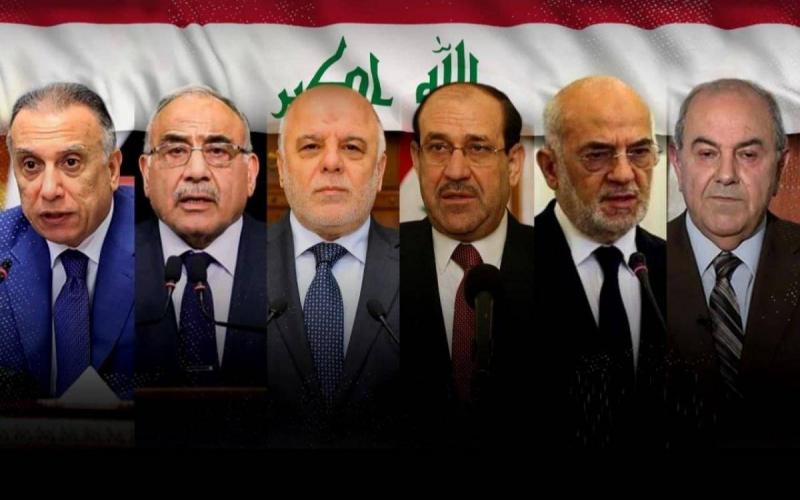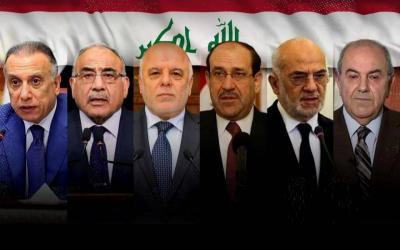Iraq has entered a new political phase amid escalating tensions between Iranian-backed Iraqi armed factions and U.S. forces. This has affected the relationship between these factions and the Iraqi government and its prime minister, who has informed Washington of his intention to withdraw direct U.S. military support and remove all foreign military bases from Iraq.
The relationship between Iraqi leaders and the United States has varied in form and substance from one prime minister to another and across different eras. This disagreement, which came to the forefront since October 7, following the outbreak of war in Gaza, is the most dangerous since 2003, after the formation of the interim Iraqi government led by Iyad Allawi, following the U.S.-led coalition invasion of Iraq, which resulted in the overthrow of former President Saddam Hussein and his ruling Baath Party.
After Allawi, the prime minister's office was held by Ibrahim al-Jaafari, Nuri al-Maliki, Haider al-Abadi, Adel Abdul Mahdi, Mustafa al-Kadhimi, and then Muhammad Shia' al-Sudani. The most controversial figure among them has been Iyad Allawi, who shifted from being part of the Iraqi Baath Party to becoming a U.S. ally before turning against everyone, including Iran.
Who is Iyad Allawi? Born in 1945, Allawi is fluent in English and earned degrees in medicine from London. He spent more than 30 years in exile and returned as a U.S. ally after the invasion. Allawi, a former member of the now-banned Baath Party, claims he survived an assassination attempt by Baathist agents in London in 1987 while Saddam Hussein was in power.
Allawi became one of the most prominent critics of the American invasion and the Shiite-led government under Nuri al-Maliki, accusing it of failing to provide better services and security conditions to reduce unemployment rates after four years in power. He also sharply criticized Iran for its interference in Iraq's affairs and its support for Shiite factions, although reports indicated he later sought to improve his relationship with Tehran. His visit to Saudi Arabia before the elections stirred controversy among Iraqis skeptical of foreign interventions.
After a long absence from the political arena, Allawi has made statements that stirred debate regarding his timely intentions. The former Iraqi prime minister stated that "the authorities that came after the fall of the regime conducted investigations and did not find a single asset in the name of Saddam Hussein, including the plane he used for travel." He added that "Saddam's concern was power, not money, and he did not approach 'ill-gotten gains' because he was conservative." He affirmed that "Saddam led a team in resisting the American occupation."
Allawi noted that despite his personal wounds from the assassination attempt by the regime, he refused to visit Saddam after his arrest so he would not see "the president of Iraq in the hands of occupation soldiers," and because traditions do not permit gloating, indicating that Kurdish leader Masoud Barzani also refused for the same reason.
Allawi's differentiated positions from other Iraqi prime ministers have significantly impacted Iraq and the region. He is the only one who declared Iraq's readiness for normalization with Israel but under certain conditions. Allawi insisted that Palestinians have suffered "harm and humiliation," and that Israel has not respected the two-state solution. Regarding the ongoing conflict in Gaza, he revealed a proposal he submitted to stop the war, noting that "the emergence of Hamas and other movements is a natural consequence of Israel's repressive policies." He pointed out that "the Cairo summit did not produce any agreement or final statement, and it was more like 'a courtesy gesture,' warning that we may face a wide and prolonged war, and that the Iron Dome that Israel boasts about is 'just a tin can,' considering that 'the government of Al-Sudani's stance on the Palestine crisis is excellent, and Arab leaders were pleased with Al-Sudani's remarks at the Cairo summit.'"
Iyad Allawi stated: "Iraq is ready for normalization if the region moves in that direction under conditions, and I affirm that most Iraqi political forces are ready for normalization." He warned that "Iraq will suffer significant harm if the war expands in the region, and I am warning early because positions in Iraq may erupt at any moment. Attacks by factions against American bases will not change the rules of the Gaza war." He pointed out that "Saudi Arabia demands a two-state solution in exchange for its normalization, and that Saudi Arabia could obtain a nuclear bomb 'immediately,' noting that 'Iraq is prepared for normalization if the region moves in that direction under conditions, and I confirm that most Iraqi political forces are ready for normalization.'"
Allawi attempts to reestablish himself after being swept away by conflicting currents that have dominated Iraq. A statesman and pragmatic politician practicing the language of dialogue, he denies being a Trojan Horse for American or Saudi interests in Iraq, but his actions, coupled with U.S. efforts to ensure he takes the prime minister post, indicate otherwise. Allawi may return to the forefront, but he will remain without regional or international support, especially after the breaches in the alliances he built at various times.




